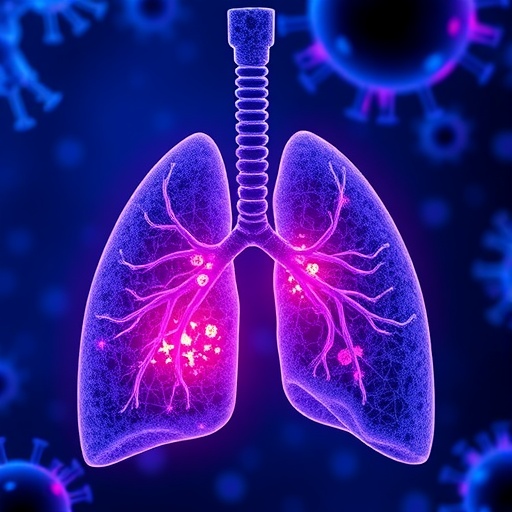In a groundbreaking study that could reshape the treatment landscape for lung adenocarcinoma, researchers have identified AKR1C3 as a potential therapeutic target for overcoming resistance to erlotinib, a commonly used medication in this area. This investigation, carried out by Cho et al., published in Military Medicine Research, emphasizes the urgent need for innovative strategies to counteract the inevitability of drug resistance that plagues many cancer therapies and often leads to treatment failure in patients.
Erlotinib, an epidermal growth factor receptor (EGFR) inhibitor, has been a cornerstone in the treatment regimen for lung adenocarcinoma, especially for patients harboring specific EGFR mutations. Despite its efficacy, many individuals ultimately experience disease progression due to acquired resistance, which poses a significant clinical challenge. The emergence of resistance mechanisms creates a pressing need for alternative therapeutic options, and thereby, the findings around AKR1C3 open doors to new potential treatments that could be used effectively alongside existing drugs.
The study delves deeply into the mechanistic roles that AKR1C3 plays in mediating cellular responses to erlotinib. Through a series of in vitro experiments, the researchers demonstrated that high levels of AKR1C3 are associated with reduced sensitivity to the drug. This discovery highlights a crucial link between the enzyme’s activity and the survival of cancer cells in the presence of erlotinib. By silencing the expression of AKR1C3, they noted a substantial increase in the susceptibility of cancer cells to the cytotoxic effects of erlotinib, indicating that targeting AKR1C3 may not only bypass resistance but also enhance therapeutic efficacy.
Additionally, this pivotal research provides valuable insights into the biochemical pathways mediated by AKR1C3. The enzyme is known to be involved in the metabolism of various steroids and isomers. By altering the steroidogenic response in tumor cells, AKR1C3 can influence cell proliferation and apoptotic processes. This metabolic reprogramming plays a central role in the development of drug resistance, underscoring the enzyme’s relevance in cancer biology and treatment.
Moreover, the researchers shed light on the genetic and epigenetic alterations that lead to increased expression levels of AKR1C3 in lung adenocarcinoma. Genetic profiling of patient tumor samples showed that high AKR1C3 expression correlated with poorer overall survival. Such compelling data reinforces the dual role of AKR1C3 as both a biomarker for prognosis and a target for therapeutic intervention.
In essence, targeting AKR1C3 could pave the way for the development of combination therapies that not only re-sensitize resistant tumors to erlotinib but also potentially minimize the side effects associated with conventional therapies. The research team advocates for further investigations into inhibitors of AKR1C3, envisioning a future where tailored treatment approaches can offer new hope to patients with refractory lung adenocarcinoma.
From a clinical standpoint, the advent of personalized medicine has brought forth the necessity to explore treatment options based on individual tumor characteristics. The results published by Cho et al. support this paradigm shift, emphasizing the importance of understanding unique tumor biology in formulating effective treatment plans. By identifying AKR1C3 as a therapeutic target, oncologists may develop drugs that either directly inhibit the enzyme or modulate its expression, thereby improving patient outcomes.
As the scientific community digests these findings, there is cautious optimism that a concerted effort to validate AKR1C3 inhibition in clinical trials will follow. The integration of such therapies in clinical practice could significantly change the trajectory for lung cancer patients who have limited options post-erlotinib failure.
In summary, Cho et al.’s research culminates in a compelling narrative of hope against the backdrop of a formidable adversary—drug resistance in cancer. As the quest for effective treatments continues, the emphasis on AKR1C3 presents a transformative approach that not only addresses resistance mechanisms but also advances our understanding of lung adenocarcinoma biology. Concerted research efforts in this domain could indeed herald a new era in cancer treatment, unlocking new possibilities for patients in dire need of effective solutions.
In conclusion, the identification of AKR1C3 as a crucial factor in drug resistance presents an enticing opportunity within therapeutic development. It is a clarion call to researchers and clinicians alike to rally behind innovative treatment approaches, leveraging our growing understanding of cancer metabolism and genetics to outsmart the unyielding nature of resistant tumors, thus transforming the landscape of lung adenocarcinoma therapy for many years to come.
Subject of Research: Overcoming erlotinib resistance in lung adenocarcinoma via AKR1C3 targeting.
Article Title: AKR1C3 as a therapeutic target to overcome erlotinib resistance in lung adenocarcinoma.
Article References: Cho, W.C., Li, K.P., Wong, C.F. et al. AKR1C3 as a therapeutic target to overcome erlotinib resistance in lung adenocarcinoma. Military Med Res 12, 8 (2025). https://doi.org/10.1186/s40779-025-00593-4
Image Credits: AI Generated
DOI:
Keywords: AKR1C3, erlotinib, lung adenocarcinoma, drug resistance, targeted therapy, personalized medicine




